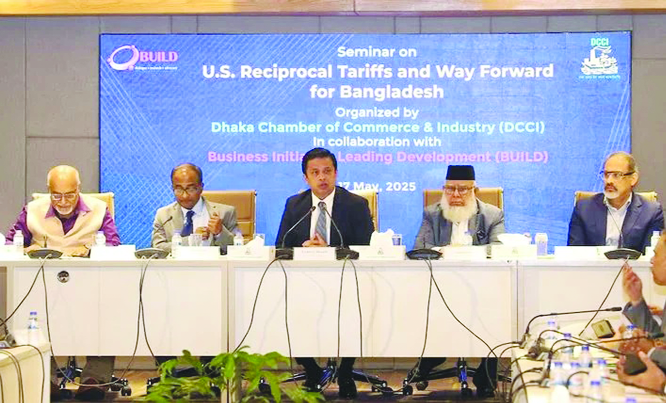

TBT DESK: Speakers at a seminar on Saturday stressed the need for expediting strategic economic diplomacy, striking an FTA and importing more cotton and LNG from the USA to prudently face the US tariff issue.
They also put emphasis on ensuring uninterrupted energy supply to industries, institutionalising the private sector collaborations and providing policy support to the private sector to this end.
They asserted while addressing a seminar on "US Reciprocal Tariffs and the Way Forward for Bangladesh" jointly organised by the Dhaka Chamber of Commerce and Industry (DCCI) and Business Initiatives Leading Development (BUILD) at the DCCI Auditorium.
Commerce Secretary Mahbubur Rahman spoke at the seminar as the chief guest, while the President of the International Chamber of Commerce-Bangladesh (ICC-B) spoke as the special guest.
DCCI President Taskeen Ahmed gave the address of welcome, while Chairperson of BUILD Abul Kasem Khan made the introductory remarks.
Country's renowned economist and distinguished fellow of the Centre for Policy Dialogue (CPD), Dr Debapriya Bhattacharya, made the keynote presentation.
Chairman and CEO of Policy Exchange of Bangladesh, Dr M Masrur Reaz, former DCCI President and Managing Director of Shasha Denims, Shams Mahmud, BTMA Director, Engineer Razeeb Haider and Executive Director of Bangladesh Bank, Md Mezbaul Haque, spoke as panellists.
Presenting the keynote paper, Dr Debapriya Bhattacharya called for a shift in mindse,t urging policymakers and businesses to treat crises as opportunities for reform and resilience.
"When any disaster comes, it should be treated as an opportunity…this is the high time for making reforms," he said. Bhattacharya said that increasing tariffs in the name of reciprocity often ends up hurting the end consumers.
"Ultimately, it is the people who bear the cost of protectionism," he added.
On Bangladesh's upcoming graduation from the least developed country (LDC) category, he sought to dispel prevailing fears.
"Despite growing panic, the reality is that LDC graduation will not plunge us into a tough situation overnight," he said, adding that a pragmatic approach and sound policy frameworks can ease the transition.
Dr Debapriya also noted that Bangladesh would not lose its relative competitiveness following LDC graduation.
He said that Bangladesh should not respond to the US reciprocal tariff move with a knee-jerk reaction rather view it as an opportunity.
Commerce Secretary Mahbubur Rahman said that Bangladesh is very positive in terms of reducing the trade deficit with the USA by increasing the import of goods and services from the USA.
Following the imposition of a tariff by the US government, he said Bangladesh had engaged with them without any delay. "We're responding in the right way," he added.
Regarding cotton imports from the USA, he also said that a warehouse could be set up in Bangladesh to expedite Bangladesh's cotton imports from the USA.
Mahbubur mentioned that a long-term LNG import agreement with the United States would increase bilateral trade between the two countries by almost $1 billion.
He said the issue of importing US goods and services from third countries would be placed in the first discussion session of negotiations so that they treat it as a direct import.
The Commerce Secretary also informed that the government is planning to withdraw the mandatory radiation test, primarily to reduce import costs and processing time.
Dr M Masrur Reaz, Chairman of Policy Exchange of Bangladesh, suggested charting the political economy of the USA first and thus taking a well-prepared approach before making any reaction.
He said that Bangladesh's import demand for cotton, soybean and LNG is continuously increasing, so bilateral talks with the US should continue, including these products for win-win benefits.
Reaz also emphasised enhancing the capacity of the logistics sector of Bangladesh to increase the competitiveness in the long run.
ICC-B President Mahbubur Rahman suggested continuing negotiations effectively to this end.
He also suggested reducing reliance on the single market by expanding exports to new regions, particularly in Asia, the Middle East and Africa.
Md Mesbaul Haque, Executive Director of Bangladesh Bank, said that the tariff shock would create a price war that would lead to the need to increase efficiency and cost reduction.
"If the structural efficiency of the financial market is not ensured, financial management stability will not come," he opined.
DCCI former President Shams Mahmud said that Bangladesh's import of US products from a third country should be considered as direct import by the US government, while the issue should be raised during negotiations.
He also urged the government to ensure adequate power and energy supply to the industries for smooth production.
BUILD Chairperson Abul Kasem Khan emphasised examining the feasibility of signing a free trade agreement with the United States.
He also said that adequate policy support is needed for export products diversification and further requested for formulation of a roadmap for expanding new export markets.
Kasem also requested the government to allow offshore investment of Bangladeshi companies, which would actually facilitate better supply management with reduced cost.
BTMA Director Eng Razeeb Haider said that if American cotton exporters are provided with warehouse facilities in Bangladesh, the import of cotton by Bangladesh would increase fourfold.
DCCI President Taskeen Ahmed said that Bangladesh needs to respond to this initiative diplomatically and strategically, along with the move for policy reforms to protect and sustain export sectors.
"We must consider both immediate and long-term solutions, such as expanding non-traditional markets, expediting FTAs, deep and strategic economic diplomacy, improving competitiveness through technology and skill development and addressing long-standing issues in our trade facilitation system," he added.
DCCI former Presidents Aftab-ul Islam, Osama Taseer, DCCI Senior Vice-President Razeev H Chowdhury and Vice-President Md Salem Sulaiman was present on the occasion, among others.
